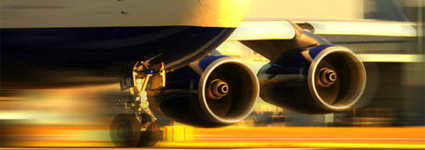How to Deal with Jet Lag

When you travel across more than two time zones on an airline flight, you are certain to be affected by jet lag to some degree. Jet lag usually identifies itself by making you feel very tired and lethargic. Your body clock becomes disoriented because you are now in a place where everything happens at a different hour than what you are used to. Just remember that it takes anywhere between 12 and 24 hours to make the transition for every time zone you cross. So, if you have crossed 4 time zones, it will take you around 2-4 days to adapt to the change.
Fortunately there are many ways to cushion the affects of jet lag and here are just a few of them.
If you are having trouble sleeping during the flight, it can compound the effects of jet lag. First of all, get as comfortable as possible. Recline your seat back as far as it will go, place an inflatable neck rest around your neck, put in some ear plugs and wear eye-shades.
Still not asleep? Make sure you have a heavy meal with lots of carbohydrates before you sleep. Your body will be working overtime digesting it, which in turn will make you quite drowsy. If this still doesn’t help, try taking melatonin. It is a drug that mimics the natural hormone found in the human body which promotes sleep. You should ask your doctor before taking any medication.
Try to sleep during the “night” hours of your destination. If your flight arrives in the morning, try to sleep on the plane. If the flight arrives in the evening, try not to sleep on the plane so that you will want to sleep when you arrive. If you are dead tired when arriving during the daylight hours, go for a walk outside. The sunlight will help you wake up and feel more alert.
A few days before you leave, change your watch’s time so that it corresponds with the time of your destination. Try to live your life according to that time. This means you might be having your dinner 5 hours earlier or going to sleep either much earlier, or later than usual. It will seem strange but it will help to make the transition easier.
- Make sure that you have slept well in the previous few nights before the trip. If you arrive at the airport already tired, then you have a long trip ahead of you.
- Avoid stress where possible. Arrive early at the airport and try to stay relaxed.
- Alcohol compounds the affects of jet lag so try to abstain from drinking during the flight and drink lots of water.
- Exercise is another effective way of waking yourself up.

Activity